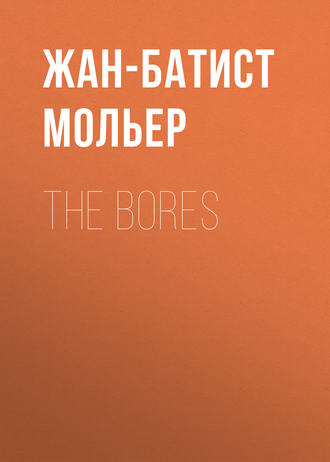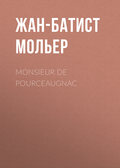
Мольер (Жан-Батист Поклен)
The Bores
SCENE IX. – ALCANDRE, ORPHISE, ÉRASTE, LA MONTAGNE
ALC. (To Orphise). Marquis, one word. Madame, I pray you to pardon me, if I am indiscreet in venturing, before you, to speak with him privately. (Exit Orphise).
SCENE X. – ALCANDRE, ÉRASTE, LA MONTAGNE
ALC. I have a difficulty, Marquis, in making my request; but a fellow has just insulted me, and I earnestly wish, not to be behind-hand with him, that you would at once go and carry him a challenge from me. You know that in a like case I should joyfully repay you in the same coin.
ER. (After a brief silence). I have no desire to boast, but I was a soldier before I was a courtier. I served fourteen years, and I think I may fairly refrain from such a step with propriety, not fearing that the refusal of my sword can be imputed to cowardice. A duel puts one in an awkward light, and our King is not the mere shadow of a monarch. He knows how to make the highest in the state obey him, and I think that he acts like a wise Prince. When he needs my service, I have courage enough to perform it; but I have none to displease him. His commands are a supreme law to me; seek some one else to disobey him. I speak to you, Viscount, with entire frankness; in every other matter I am at your service. Farewell.
[Footnote: During his long reign, Louis XIV. tried to put a stop to duelling; and, though he did not wholly succeed, he prevented the seconds from participating in the fight, – a custom very general before his rule, and to which Éraste alludes in saying that he does not "fear that the refusal of his (my) sword can be imputed to cowardice."]
SCENE XI. – ÉRASTE, LA MONTAGNE
ER. To the deuce with these bores, fifty times over! Where, now, has my beloved gone to?
LA M. I know not.
ER. Go and search everywhere till you find her. I shall await you in this walk.
BALLET TO ACT I
First Entry.
Players at Mall, crying out "Ware!" compel Éraste to draw back. After the players at Mall have finished, Éraste returns to wait for Orphise.
Second Entry.
Inquisitive folk advance, turning round him to see who he is, and cause him again to retire for a little while.
* * * * *
ACT II
SCENE I. – ÉRASTE, alone
Are the bores gone at last? I think they rain here on every side. The more I flee from them, the more I light on them; and to add to my uneasiness, I cannot find her whom I wish to find. The thunder and rain have soon passed over, and have not dispersed the fashionable company. Would to Heaven that those gifts which it showered upon us, had driven away all the people who weary me! The sun sinks fast; I am surprised that my servant has not yet returned.
SCENE II. – ALCIPPE, ÉRASTE
ALC. Good day to you.
ER. (Aside). How now! Is my passion always to be turned aside?
ALC. Console me, Marquis, in respect of a wonderful game of piquet which I lost yesterday to a certain Saint-Bouvain, to whom I could have given fifteen points and the deal. It was a desperate blow, which has been too much for me since yesterday, and would make me wish all players at the deuce; a blow, I assure you, enough to make me hang myself in public. – I wanted only two tricks, whilst the other wanted a piquet. I dealt, he takes six, and asks for another deal. I, having a little of everything, refuse. I had the ace of clubs (fancy my bad luck!) the ace, king, knave, ten and eight of hearts, and as I wanted to make the point, threw away king and queen of diamonds, ten and queen of spades. I had five hearts in hand, and took up the queen, which just made me a high sequence of five. But my gentleman, to my extreme surprise, lays down on the table a sequence of six low diamonds, together with the ace. I had thrown away king and queen of the same colour. But as he wanted a piquet, I got the better of my fear, and was confident at least of making two tricks. Besides the seven diamonds he had four spades, and playing the smallest of them, put me in the predicament of not knowing which of my two aces to keep. I threw away, rightly as I thought, the ace of hearts; but he had discarded four clubs, and I found myself made Capot by a six of hearts, unable, from sheer vexation, to say a single word.
[Footnote: In the seventeenth century, piquet was not played with thirty-two, but with thirty-six, cards; the sixes, which are now thrown away, remained then in the pack. Every player received twelve cards, and twelve remained on the table. He who had to play first could throw away seven or eight cards, the dealer four or five, and both might take fresh ones from those that were on the table. A trick counted only when taken with one of the court-cards, or a ten.
Saint-Bouvain, after having taken up his cards, had in hand six small diamonds with the ace, which counted 7, a sequence of six diamonds from the six to the knave counted 16, thus together 23, before he began to play. With his seven diamonds he made seven tricks, but only counted 3, for those made by the ace, knave, and ten; this gave him 26. Besides his seven diamonds he had four spades, most likely the ace, king, knave, and a little one, and a six of hearts; though he made all the tricks he only counted 3, which gave him 29. But as Alcippe had not made a single trick, he was capot, which gave Saint-Bouvain 40; this with the 29 he made before, brought the total up to 69. As the latter only wanted a piquet, that is 60, – which is when a player makes thirty in a game, to which an additional thirty are then added, Saint-Bouvain won the game. Alcippe does not, however, state what other cards he had in his hand at the moment the play began besides the ace of clubs and a high sequence of five hearts, as well as the eight of the same colour.]
By Heaven, account to me for this frightful piece of luck. Could it be credited, without having seen it?
[Footnote: Compare with Molière's description of the game of piquet Pope's poetical history of the game of Ombre in the third Canto of The Rape of the Lock.]
ER. It is in play that luck is mostly seen.
ALC. 'Sdeath, you shall judge for yourself if I am wrong, and if it is without cause that this accident enrages me. For here are our two hands, which I carry about me on purpose. Stay, here is my hand, as I told you; and here …
ER. I understood everything from your description, and admit that you have a good cause to be enraged. But I must leave you on certain business. Farewell. But take comfort in your misfortune.
ALC. Who; I? I shall always have that luck on my mind; it is worse than a thunderbolt to me. I mean to shew it to all the world. (He retires and on the point of returning, says meditatively) A six of hearts! two points.
ER. Where in the world are we? Go where we will, we see nothing but fools.
SCENE III. – ÉRASTE, LA MONTAGNE
ER. Ha! how long you have been, and how you have made me suffer.
LA M. Sir, I could not make greater haste.
ER. But at length do you bring me some news?
LA M. Doubtless; and by express command, from her you love, I have something to tell you.
ER. What? Already my heart yearns for the message. Speak!
LA M. Do you wish to know what it is?
ER. Yes; speak quickly.
LA M. Sir, pray wait. I have almost run myself out of breath.
ER. Do you find any pleasure in keeping me in suspense?
LA M. Since you wish to know at once the orders which I have received from this charming person, I will tell you… Upon my word, without boasting of my zeal, I went a great way to find the lady; and if…
ER. Hang your digressions!
LA M. Fie! you should somewhat moderate your passion; and Seneca…
ER. Seneca is a fool in your mouth, since he tells me nothing of all that concerns me. Tell me your message at once.
LA M. To satisfy you, Orphise … An insect has got among your hair.
ER. Let it alone.
LA M. This lovely one sends you word …
ER. What?
LA M. Guess.
ER. Are you aware that I am in no laughing mood?
LA M. Her message is, that you are to remain in this place, that in a short time you shall see her here, when she has got rid of some country-ladies, who greatly bore all people at court.
ER. Let us, then stay in the place she has selected. But since this message affords me some leisure, let me muse a little. (Exit La Montagne). I propose to write for her some verses to an air which I know she likes.
(He walks up and down the stage in a reverie).
SCENE IV. – ORANTE, CLIMÈNE, ÉRASTE (at the side of the stage, unseen.)
OR. Everyone will be of my opinion.
CL. Do you think you will carry your point by obstinacy?
OR. I think my reasons better than yours.
CL. I wish some one could hear both.
OR. I see a gentleman here who is not ignorant; he will be able to judge of our dispute. Marquis, a word, I beg of you. Allow us to ask you to decide in a quarrel between us two; we had a discussion arising from our different opinions, as to what may distinguish the most perfect lovers.
ER. That is a question difficult to settle; you had best look for a more skilful judge.
OR. No: you speak to no purpose. Your wit is much commended; and we know you. We know that everyone, with justice, gives you the character of a…
ER. Oh, I beseech you …
OR. In a word, you shall be our umpire, and you must spare us a couple of minutes.
CL. (To Orante). Now you are retaining one who must condemn you: for, to be brief, if what I venture to hold be true, this gentleman will give the victory to my arguments.
ER. (Aside). Would that I could get hold of any rascal to invent something to get me off!
OR. (To Climène). For my part, I am too much assured of his sense to fear that he will decide against me. (To Éraste). Well, this great contest which rages between us is to know whether a lover should be jealous.
CL. Or, the better to explain my opinion and yours, which ought to please most, a jealous man or one that is not so?
OR. For my part, I am clearly for the last.
CL. As for me, I stand up for the first.
OR. I believe that our heart must declare for him who best displays his respect.
CL. And I that, if our sentiments are to be shewn, it ought to be for him who makes his love most apparent.
OR. Yes; but we perceive the ardour of a lover much better through respect than through jealousy.
CL. It is my opinion that he who is attached to us, loves us the more that he shows himself jealous?
OR. Fie, Climène, do not call lovers those men whose love is like hatred, and who, instead of showing their respect and their ardour, give themselves no thought save how to become wearisome; whose minds, being ever prompted by some gloomy passion, seek to make a crime out of the slightest actions, are too blind to believe them innocent, and demand an explanation for a glance; who, if we seem a little sad, at once complain that their presence is the cause of it, and when the least joy sparkles in our eyes, will have their rivals to be at the bottom of it; who, in short, assuming a right because they are greatly in love, never speak to us save to pick a quarrel, dare to forbid anyone to approach us, and become the tyrants of their very conquerors. As for me, I want lovers to be respectful; their submission is a sure proof of our sway.
CL. Fie, do not call those men true lovers who are never violent in their passion; those lukewarm gallants, whose tranquil hearts already think everything quite sure, have no fear of losing us, and overweeningly suffer their love to slumber day by day, are on good terms with their rivals, and leave a free field for their perseverance. So sedate a love incites my anger; to be without jealousy is to love coldly. I would that a lover, in order to prove his flame, should have his mind shaken by eternal suspicions, and, by sudden outbursts, show clearly the value he sets upon her to whose hand he aspires. Then his restlessness is applauded; and, if he sometimes treats us a little roughly, the pleasure of seeing him, penitent at our feet, to excuse himself for the outbreak of which he has been guilty, his tears, his despair at having been capable of displeasing us, are a charm to soothe all our anger.
OR. If much violence is necessary to please you, I know who would satisfy you; I am acquainted with several men in Paris who love well enough to beat their fair ones openly.
CL. If to please you, there must never be jealousy, I know several men just suited to you; lovers of such enduring mood that they would see you in the arms of thirty people without being concerned about it.
OR. And now you must, by your sentence, declare whose love appears to you preferable.
(Orphise appears at the back of the stage, and sees Éraste between Orante and Climène).
ER. Since I cannot avoid giving judgment, I mean to satisfy you both at once; and, in order, not to blame that which is pleasing in your eyes, the jealous man loves more, but the other loves wisely.
CL. The judgment is very judicious; but…
ER. It is enough. I have finished. After what I have said permit me to leave you.







